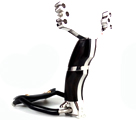Aluminium alloy It is alloy in which aluminium (Al) is the predominant metal.The typical alloying elements are copper, magnesium, manganese, silicon, tin and zinc. Aluminium alloys are widely used in engineering structures and components where light weight or corrosion resistance is required. 304 Stainless Steel Very high corrosion resistance, although not quite as good as 316.304 stainless steel is used for a variety of household and industrial applications such as screws, machinery parts, car headers, and food-handling equipment. 440C Stainless Steel It is heat treated to reach hardness of 58-60HRC. Provides a good combination of corrosion resistance with hardness. It is a bearing steel, and used in rolling contact stainless bearings, e.g. ball and roller bearings. It is also used to make knife blades. 316 Stainless Steel An austenitic stainless steel, 316 provides a high degree of corrosion and chemical resistance. It is often used for building nuclear reprocessing plants. 630 Stainless Steel 630 is a 17-4 PH martensitic precipitation hardening stainless steel with a unique combination of high strength and good corrosive resistance. It is characterised by high tensile strength and high yield strength obtained by solution annealing, followed by a low temperature age hardening treatment. Here it is employed for applications such as: pump shafts, aircraft fittings etc... |
|
|
||
 |
 |
 |
 |
 |
 |
 |
||
|
|
||
 |
 |
 |
 |
 |
 |
 |
 |
 |
|
440C Stainless Steel |
||
 |
 |
 |
 |
 |
|
|
|
||
 |
 |
|
|
|
||
 |
 |
 |
 0 item(s) - $0.00
0 item(s) - $0.00












